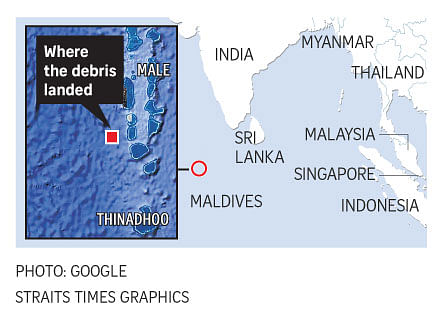Debris from Chinese rocket lands in Indian Ocean near Maldives
Sign up now: Get insights on Asia's fast-moving developments
Remnants of China's biggest rocket landed in the Indian Ocean on Sunday, with the bulk of its components destroyed upon re-entry into the Earth's atmosphere, according to Chinese state media, ending speculation over where the debris would hit.
BEIJING (AFP, REUTERS) - A large segment of a Chinese rocket re-entered the Earth's atmosphere and disintegrated over the Indian Ocean on Sunday (May 9), the Chinese space agency said, following fevered speculation over where the 18-tonne object would come down.
Officials in Beijing had said there was little risk from the freefalling segment of the Long March-5B rocket, which had launched the first module of China's new space station into Earth orbit on April 29.
"After monitoring and analysis, at 10.24am (0224 GMT) on May 9, 2021, the last-stage wreckage of the Long March 5B Yao-2 launch vehicle has re-entered the atmosphere," the China Manned Space Engineering Office said in a statement, providing coordinates for a point in the Indian Ocean near the Maldives.
It added that most of the segment disintegrated and was destroyed during re-entry.
Monitoring service Space-Track, which uses US military data, also confirmed the re-entry.
"Everyone else following the #LongMarch5B re-entry can relax. The rocket is down," it tweeted.
The segment's descent matched predictions by some experts that any debris would have splashed down into the ocean, given that 70 per cent of the planet is covered by water.
But the uncontrolled re-entry of such a large object had sparked concerns about possible damage and casualties, despite there being a low statistical chance.
American and European space authorities were among those tracking its orbits and trying to determine when and where it may come down.
US Defence Secretary Lloyd Austin had said the US military had no plans to shoot it down, but suggested that China had been negligent in letting it fall out of orbit.
On Sunday, the US Space command confirmed the re-entry of the rocket over the Arabian Peninsula, but said it was unknown if the debris impacted land or water.
"The exact location of the impact and the span of debris, both of which are unknown at this time, will not be released by US Space Command," it said in a statement on its website.
Last year, debris from another Long March rocket fell on villages in the Ivory Coast, causing structural damage but no injuries or deaths.
"An ocean re-entry was always statistically the most likely," Harvard-based astrophysicist Jonathan McDowell tweeted. "It appears China won its gamble (unless we get news of debris in the Maldives). But it was still reckless."
Mr McDowell had said earlier that China should redesign the Long March-5B to avoid such scenarios.

He told Reuters that the potential debris zone could have been as far north as New York, Madrid or Beijing, and as far south as southern Chile and Wellington, New Zealand.
Since large chunks of the Nasa space station Skylab fell from orbit in July 1979 and landed in Australia, most countries have sought to avoid such uncontrolled re-entries through their spacecraft design, Mr McDowell said.
"It makes the Chinese rocket designers look lazy that they didn't address this," said Mr McDowell.
"Spacefaring nations must minimise the risks to people and property on Earth of re-entries of space objects and maximise transparency regarding those operations," Nasa administrator Bill Nelson, a former senator and astronaut who was picked for the role in March, said in a statement after the re-entry.
"It is clear that China is failing to meet responsible standards regarding their space debris."
With most of the Earth's surface covered by water, the odds of populated area on land being hit had been low, and the likelihood of injuries even lower, according to experts. But uncertainty over the rocket's orbital decay and China's failure to issue stronger reassurances in the run-up to the re-entry fuelled anxiety.
"It is critical that China and all spacefaring nations and commercial entities act responsibly and transparently in space to ensure the safety, stability, security, and long-term sustainability of outer space activities," Mr Nelson said.
The Global Times, a Chinese tabloid, dismissed as "Western hype" concerns the rocket was "out of control" and could cause damage.
"It is common practice across the world for upper stages of rockets to burn up while re-entering the atmosphere," Mr Wang Wenbin, a spokesman at China's foreign ministry, said at a regular media briefing last Friday.
"To my knowledge, the upper stage of this rocket has been deactivated, which means most of its parts will burn up upon re-entry, making the likelihood of damage to aviation or ground facilities and activities extremely low," Mr Wang said at the time.
The rocket, which put into orbit an unmanned Tianhe module containing what will become living quarters for three crew on a permanent Chinese space station, will be followed by 10 more missions to complete the station by 2022.


